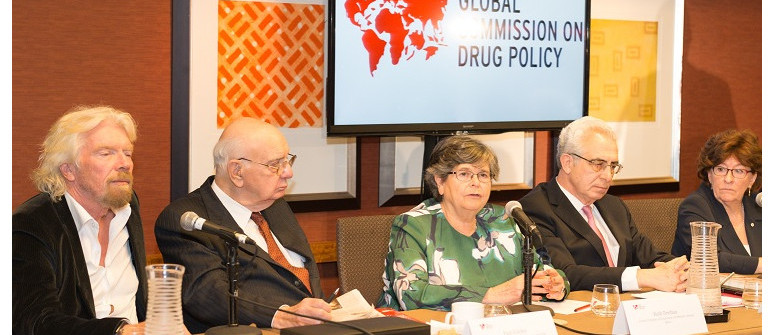Global commission on drug policy

The Global Commission on Drug Policy is a panel of leaders and thinkers that reflects on current and future strategies for drug control.
The Global Commission On Drug Policy is a panel of political leaders and thinkers concerned with global drug policy. It was established in 2011 and is made up of 23 commissioners including political leaders and other public figures/intellectuals.
The Commission aims to reflect on current drug policy and debate new, innovative strategies for better dealing with drug control in the future. It has openly claimed (on numerous occasions) that the current war on drugs has “failed” and that it’s time for governments to change their approach to dealing with drug use.
Instead of prohibiting and criminalizing drugs, the Commission urges governments and leaders to opt for progressive policies that privilege human rights, health, and safety, and simultaneously reduce the damage caused by drugs on individuals and societies.
KEY REPORTS BY THE COMMISSION
The Commission made headlines with its first report, released in June 2011, for its heavy criticism of the current War on Drugs.[1] The report argued that current drug policy hasn’t just failed, but has also delivered devastating consequences for individuals and societies across the globe.
It also called for an end to the criminalization, marginalization and stigmatization of people who use drugs, and suggests governments experiment with progressive drug policies that focus on undermining the power of organized crime and safeguard the health and security of citizens. The first step to doing so, according to the report, is to decriminalize drug use.
The report served as the cornerstone of the Commission’s approach to drug policy and received a lot of attention from political leaders, drug policy experts, and media across the world.
In 2014, the Commission followed up with another report detailing 5 pathways to more liberal and compassionate drug policies that it believed offer a viable alternative to prohibition. Since 2011, the Commission has produced 6 major reports and 3 documentary films.
NOTABLE COMMISSIONERS
The Commission is made up of 23 commissioners including:
- Asma Jahangir, human rights activist, former UN Special Rapporteur on Arbitrary, Extrajudicial and Summary Executions, Pakistan
- Carlos Fuentes, writer and public intellectual, Mexico
- César Gaviria, former President of Colombia
- Ernesto Zedillo, former President of Mexico
- Fernando Henrique Cardoso, former President of Brazil (chair)
- George Papandreou, Prime Minister of Greece
- George P. Shultz, former Secretary of State, United States (honorary chair)
- Javier Solana, former European Union High Representative for the Common Foreign and Security Policy, Spain
- John Whitehead, banker and civil servant, chair of the World Trade Center Memorial Foundation, United States
- Kofi Annan, former Secretary General of the United Nations, Ghana
- Louise Arbour, former UN High Commissioner for Human Rights, President of the International Crisis Group, Canada
- Maria Cattaui, Petroplus Holdings Board member, former Secretary-General of the International Chamber of Commerce, Switzerland
- Mario Vargas Llosa, writer and public intellectual, Peru
- Marion Caspers-Merk, former State Secretary at the German Federal Ministry of Health
- Michel Kazatchkine, executive director of the Global Fund to Fight AIDS, Tuberculosis and Malaria, France
- Paul Volcker, former Chairman of the United States Federal Reserve and of the Economic Recovery Board
- Richard Branson, entrepreneur, advocate for social causes, founder of the Virgin Group, co-founder of The Elders, United Kingdom
- Ruth Dreifuss, former President of Switzerland and Minister of Home Affairs
- Thorvald Stoltenberg, former Minister of Foreign Affairs and UN High Commissioner for Refugees, Norway





